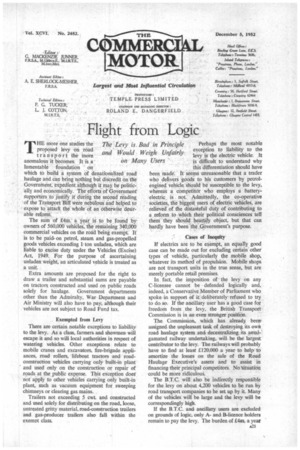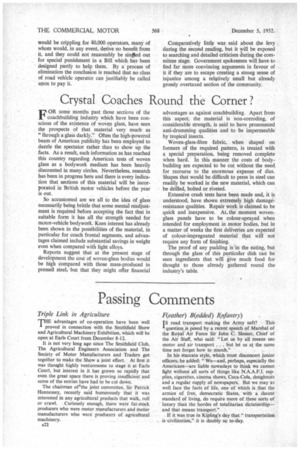Flight from Logic
Page 23

Page 24

If you've noticed an error in this article please click here to report it so we can fix it.
THE more one studies the proposed levy on road transport the more anomalous it beComes-. It is a lamentable foundation on which to build a system of denationalized. road haulage and can bring nothing but discredit on the Government, expedient although it may. be politically and economically. The efforts of Government Supporters to justify it during the second reading. of the Transport Bit/ were nebulous and helped to expose to attack the whole of an Otherwise desir able reform. . . . The sum of £4m: a year is to be found byowners of 560,000 vehicles, the reniaining 340,000 commercial vehicles on the road being exempt. It is to be paidon petrol, steam and gas-propelled goods vehicles exceeding 1-ton unladen, which are liable to excise duty under the Vehicles (Excise) Act, 1949. For the purpose of ascertaining unladen weight, an articulated vehicle is treated as a unit.
Extra amounts are proposed for the right to draw a trailer and substantial sums are payable on tractors constructed and used on public roads solely for haulage. Government departments other than the Admiralty, War Department and Air Ministry will also have to pay, although their vehicles are not subject to Road Fund tax.
Exempted from Levy There are certain notable exceptions to liability to the levy. As a class, farmers and showmen will escape it and so will local authorities in respect of watering vehicles. Other exceptions relate to mobile cranes and excavators, fire-brigade appliances, road rollers, lifeboat tractors and roadconstruction vehicles carrying only built-in plant and used only on the construction or repair of roads at the public expense. This exception does not apply to other vehicles carrying only built-in plant, such as vacuum equipment for sweeping chimneys or clearing gas mains.
Trailers not exceeding 5 cwt. and constructed and used solely for distributing on the road, loose, untreated gritty material, road-construction trailers and gas-producer trailers also fall within the exempt class. Perhaps the most notable exception to liability to the 'levy is the electric vehicle. It is difficult to understand why this differentiation should have been made: It seems unreasonable that a trader who delivers toods to his customers by petrolenginecl vehicle should be susceptible to the levy, whereas a competitor who employs a batteryelectric is not. Admittedly, the co-operative societies, the biggest users of electric vehicles, are relieved of the distasteful duty of contributing to a reform to which their political consciences tell them ; they should heartily object. but that can hardly have been the Government's purpose.
Cases of Inequity If electrics are to be exempt, an equally good case can be made out for excluding certain other types of vehicle, particularly the mobile shop, whatever its method of propulsion. Mobile shops are not transport units in the true sense, but are merely portable retail premises.
In fact, the imposition of the levy on any C-licensee cannot be defended logically and, indeed, a Conservative Member of Parliament who spoke in support of it deliberately refused to try to do. so. If the ancillary user has a good case for freedom from the levy, the British Transport Commission is in an even stronger position.
The Commission, which has already been assigned the unpleasant task of destroying its own road haulage system and decentralizing its amal-' gamated railway undertaking, will be the largest contributor to the levy. The railways will probably have to find at least £120,000 a year to help to amortize the losses on the sale of the Road Haulage Executive's assets and to assist in financing their principal competitors. No Situation could be more ridiculous, The B.T.C. will also be indirectly responsible for the levy on about 4,200 vehicles to be run by road transport companies to be set up by it. Many of the vehicles will be large and the levy will be correspondingly high.
If the B.T.C. and ancillary users are excluded on grounds of logic, only Aand B-licence holders remain to pay the levy. The burden of £4121. a year A21 would be crippling for 40,000 operators, many of whom would, in any event, derive no benefit from it, and they could not reasonably be sinfied out for special punishment in a Bill which has been designed partly to help them, By a process of elimination the conclusion is reached that no class of road vehicle operator can justifiably be called upon to pay it. Comparatively little was said about the levy during the second reading, but it will be exposed to searching and detailed criticism uring the committee stage. Government spokesmen will have to find far more convincing arguments in favour of it if they are to escape creating a strong sense of injustice among a relatively small but already grossly overtaxed section of the community.




















































































